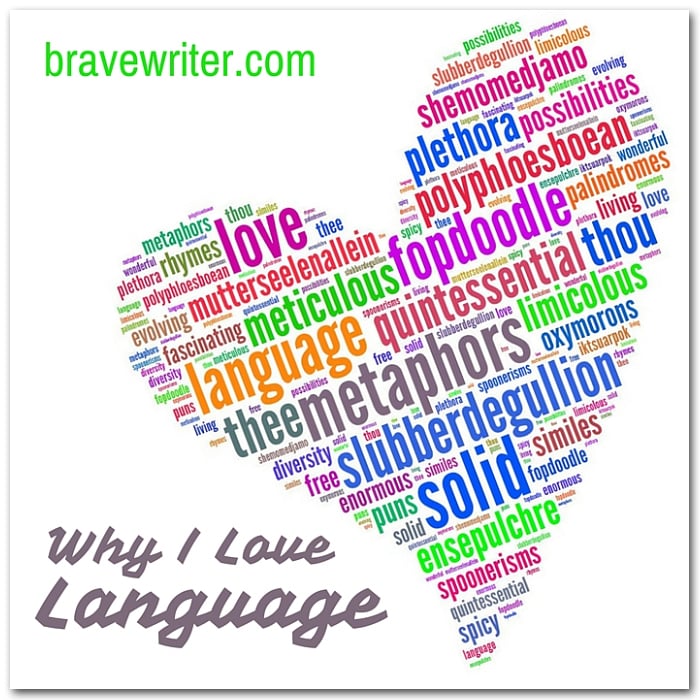Why I Love Language

by Finlay Worrallo, Brave Writer student and intern
No one knows exactly how many words the English language contains (the Global Language Monitor estimates more than a million). It’s impossible to put a definitive number on it because language is always changing and evolving. It’s like an enormous shoal of fish, with new fish swimming along to join in every few seconds and a few fish abandoning at a similar speed. If you wrote all the words in English out, once each, one after the other, you’d end up with one of the longest novels ever written (though it wouldn’t make much sense).
It’s fascinating to see how language ages and changes with the centuries. For example, back in the 1300s, correct English sounded like “Whan that aprill with his shoures soote/The droghte of march hath perced to the roote.” Then by Shakespeare’s time, English was pretty much the language it is now, but with words like “thou” and “thee” and a few others we don’t use much anymore. 250 years ago, people were using words like “fopdoodle” and “slubberdegullion” to insult each other, although those words have sadly disappeared now. These days, new words like “selfie” and “LOL” are popular, and undoubtedly in twenty years’ time English will have changed some more. Language refuses to sit still; it’s like a living creature.
I love English because of its diversity. It has plenty of solid, simple words like “the,” “yes,” and “me.” Then there are more unusual words like “quintessential,” “meticulous,” and “plethora” for special circumstances. And then there are completely bizarre words like polyphloesboean (loud-roaring), limicolous (living in mud) and ensepulchre (to put in a tomb), which aren’t that useful in everyday life but sound wonderful.
But English isn’t the world’s only language — there are many others, each fascinating in its own way. Through the centuries, we’ve created over 6,000 different languages — more than there are species of mammal. They all follow similar rules, but they all look and sound slightly different, with their own unique characteristics. Especially fun are words that don’t directly translate into English. Iktsuarpok is an Inuit word roughly meaning “to keep going outside to see if anyone’s coming,” shemomedjamo is a Georgian one meaning “to keep on eating delicious food even though you’re full,” and mutterseelenallein, is German for “utterly, completely alone.” Even a single unusual word can help you touch another country, another culture.
Language is bubbling with possibilities. The world’s words are there for anyone who wants to use them, free of charge. Language is an enormous kitchen. All the words are spices, vegetables, herbs, sauces, cheese, fruits, pulses and grains. Plenty are tasty eaten on their own, but if you take different sorts and mix them together, in large chunks and pinches, and cook them for long enough, you can create thousands of dishes.The more you can cook with, the more recipes you can cook up. That was an extended metaphor — “language is a kitchen of possibilities” — which wouldn’t be possible without metaphors, which spice up writing themselves, along with similes, puns, oxymorons, palindromes, spoonerisms, rhymes, and many more.
Language is ever-changing. It’s useful. It’s fun. It’s free. It’s forever.


















